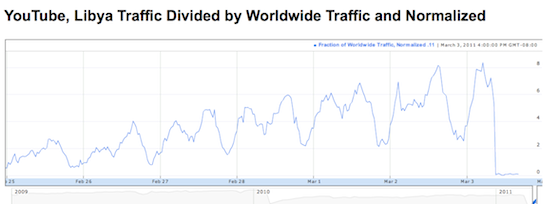This article is more than 1 year old
Libya's internet goes dark as upheaval spreads
Net communications severed
As violence escalated against people protesting Libyan leader Moammar Gadhafi, internet traffic flowing in and out of the African nation dropped to zero, making it impossible to send communications over its borders.
According to figures supplied by Google's Transparency Report, traffic flowing between Libyan computers and YouTube began a precipitous drop starting at 5 am GMT on Thursday. Four hours later, traffic vanished altogether and had yet to recover at time of writing. Libyan traffic to GMail, Blogger, and other services showed a similar pattern.

YouTube traffic to and from Libya dropped to zero. Source: Google Transparency Report
Connections to Google were by no means the only ones to be severed in Libya.
“When we do traceroutes to measure the reachability of sites inside Libya, our traceroutes don't go across the border,” James Cowie, CTO and cofounder of Renesys, told The Register. “Nothing comes back. When you go to look at Libyan websites, the ones that are hosted in Libya as opposed to the ones that are hosted in Chicago or some place, those websites simply don't answer and often the DNS isn't working, so you can't even resolve the domain name.
“All of that suggests very strongly that there's very, very, very little traffic coming in and out of LTT, the Libyan provider.”
Libya isn't the first country of late that has seen disrupted internet traffic amid tumultuous protests calling for the ouster of its leader. Five weeks ago, the Egyptian government switched off its internet as citizens called for President Hosni Mubarak to step down. In that case, the disruption was the result of a virtually across-the-board withdrawal of routes from the internet's border gateway system.
In Libya, border gateway routes are still being announced, but somehow those connections are failing to transmit any data in response to queries sent from the outside world.
“The best analogy I can think of is that, although the figurative canal system is still in place to get traffic to the right destination, Libya simply pulled the plug and drained the water,” TrendMicro researcher Rik Ferguson blogged.
Cowie said Libya's technique may give the government the option of allowing the internet to be used by forces loyal to Gadhafi while preventing its use by everyone else. But he pointed to data (PDF here) gathered by internet sensors monitored by Arbor Networks showing all traffic in and out of the country has ceased. ®
